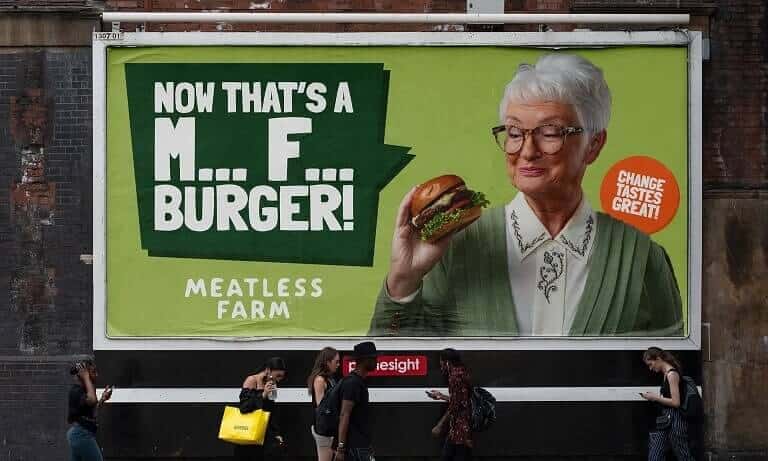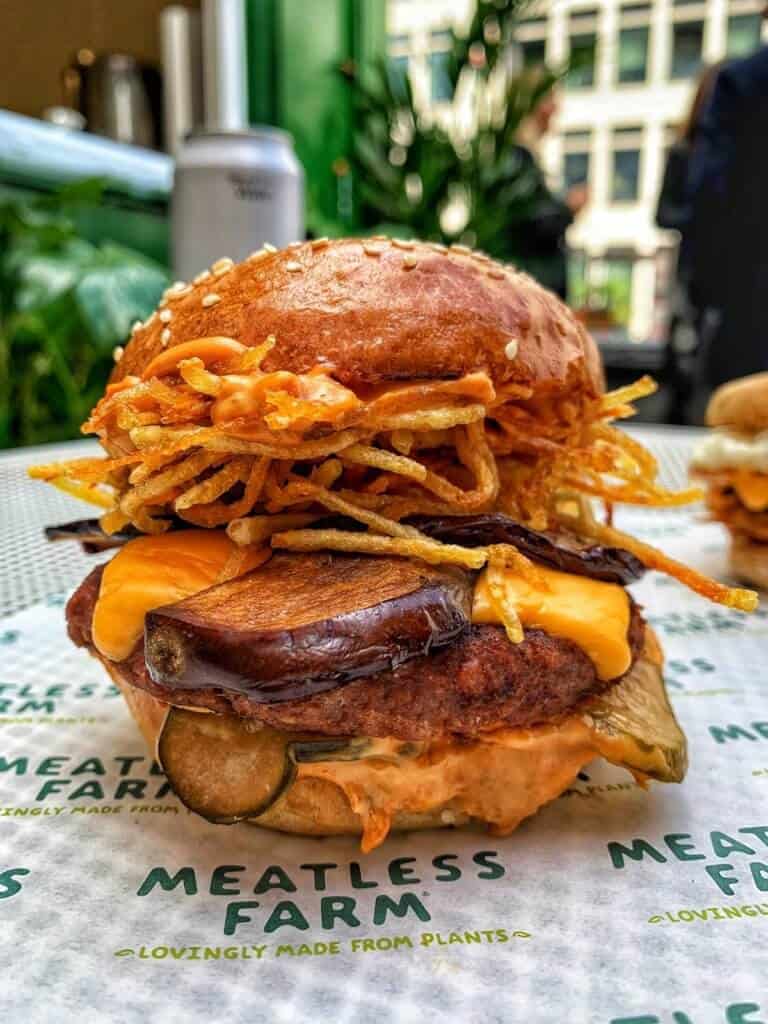The Meatless Farm is a brand that will need no introduction for our readers across the UK, especially following its unique branding and bold marketing, including the recent £1.55 million advertising campaign describing its M***F*** Burger and M***F*** Sausage, as well as the wonderful popup event the vegan M***F***drive-thru.
As the UK’s fastest growing meat alternative producer, Meatless Farm has also been steadily rising to fame in other markets. The company, originally founded in Leeds UK, has over the past two years steadily expanded into North America with its breakfast sausages; into New York foodservice and the UK’s biggest foodservice wholesaler Brakes; and into the UAE.
The Meatless Farm founder and CEO Morten Toften Bech tells us, “We are on sale worldwide, from Sydney to Stirling.”
We were interested to speak with Morten find out what makes this plant meat brand so different and consistently successful.
What is your current portfolio and which are the bestsellers?
In the UK, retailers currently list our plant-based burgers, sausages, and mince. Our mince is our bestseller and we’ve seen a 68% increase in sales year-on-year.[1] Mince is used in some of the nation’s most frequently cooked dishes such as Spaghetti Bolognese, Lasagne, Cottage pie, and Chilli Con Carne. We’re seeing a shift in consumer attitudes and an openness to eating more plant-based food and swapping it into our favourite meals.

There’s also a big seasonal impact, we had a fantastic BBQ season for our burgers (we sold almost 30% more over Summer than we did in Spring) – which was aligned with people making more sustainable and healthier choices over lockdown.
Our foodservice range also includes free-flow mince, ready to heat Meatless Bolognese, Meatballs, and Meatless cannelloni; innovation in this sector is just as important. I believe there’s an opportunity for operators and food brands to think differently, breakdown traditional relationship structures and work together to co-create new experiences and offers.
We reported in March that your brand was the fastest growing in the meat alternative sector, was that in the UK or globally? Tell us the reasons for your success.
This was in the UK and based on Kantar market data. Recent Nielsen data also supports this – showing our latest growth as 179%, ahead of the market and category[2]. Our success is down to having a clear mission, a strong product and brand offering and importantly a huge amount of passion for what we do.

Your recent ad campaign is certainly eye-catching, can you tell us how that has been received?
The M*** F*** campaign is a step-change in communication not just for Meatless Farm but for the entire plant-based category. It specifically targets meat-eaters and aims to disrupt the cultural norm that still exists – that going meat-free is unexciting. We wanted to turn that convention on its head showing that our products are interesting, taste great, and are easy to swap to without compromise. There will always be a level of pushback when you’re trying to achieve something like this but that’s why we knew it was right. We need to provoke and change people’s mindset about going meat-free.
The MF Drive-Thru popup was a unique event – please tell us how it went and do you plan to repeat it in future?
The drive-thru was a fantastic opportunity to drive awareness and trial. In addition, it was also a way of continuing the M*** F*** communications in an interesting, personality-packed way. Being a UK first it created something memorable and fun that consumers could truly engage with.
Do you think your McBluffin might have impacted on McDonald’s sales?
We created the McBluffin as a bit of a tongue and cheek nod to the iconic breakfast item and show that making a plant-based swap can be just as easy, tasty and match on a price level as well.

The collaboration for the pop up with Mother Flipper is interesting, as Mother Flippers menu isn’t vegan, can you tell us how that partnership came about, if it worked and if there will be more from this.
The campaign including the drive thru was about targeting meat-eaters. Working with Mother Flipper was testament to this. It was about getting renowned burger maestros to replicate their menu swapping in plant-based alternatives and showing just how delicious and easy it can be. We know that taste and texture are the biggest barriers to people eating more plant-based food.
Your brand has gone international – can you tell us which countries The Meatless Farm products can be found in and tell us more about your international distribution plans.
Currently we are in almost 20 markets including across Europe, US, Canada, Asia and Australia – we are on sale worldwide, from Sydney to Stirling.
What are you aiming for as a company or what is your mission, and how do you hope to achieve it?
I started Meatless Farm because my wife and I understood the importance of reducing meat consumption, and it was becoming increasingly difficult for us to create easy meals for the whole family. We’d tried some meat alternatives but these were often a mixed bag and of course simply using fresh veg, but it was never easy to create a meal that everyone would enjoy and more importantly finish!
I began to research what was on offer and the wider issues around meat reduction. One of the biggest things that struck me was discovering more about how what we eat impacts the environment. This is the core of Meatless Farm today, our mission is to reduce the world’s dependency on intensively farmed meat. Since launching in 2018 we have seen rapid growth, but we know there is still a huge challenge ahead of us to help people reduce the amount of meat they eat. The environment depends on us eating differently.
What advice do you have to new entrepreneurs and plant based startups in this increasingly crowded market?
Keep innovating; innovation is at the heart of the category and taste will always be the main motivator for people sticking with change. Make sure you have a strong purpose as a brand and stick with what you believe in.
[1] Nielsen Scantrack 12 weeks to 11 July 20
[2] Nielsen Scantrack 12 weeks to 11 July 20





